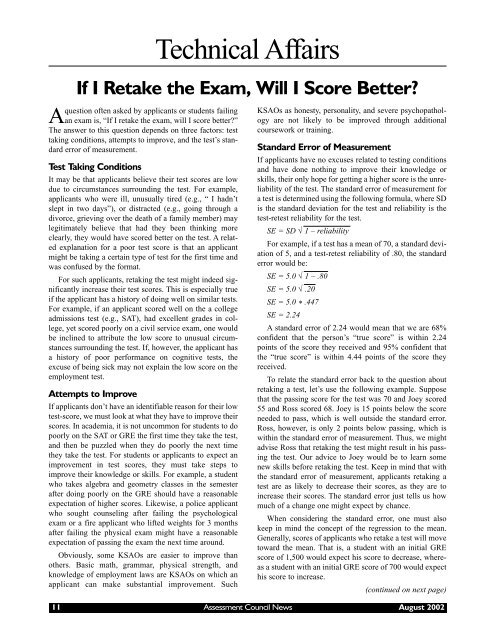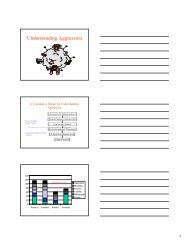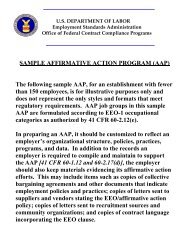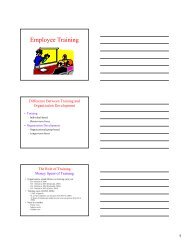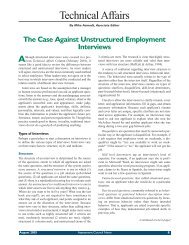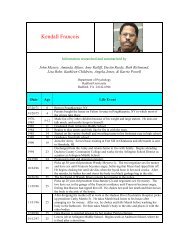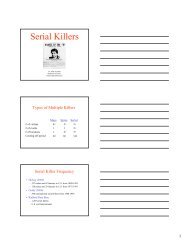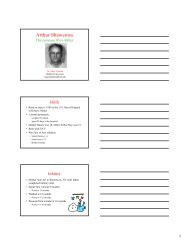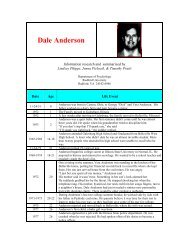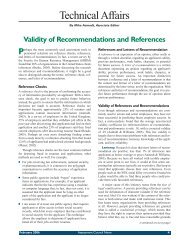If I retake the exam, will I score better?
If I retake the exam, will I score better?
If I retake the exam, will I score better?
Create successful ePaper yourself
Turn your PDF publications into a flip-book with our unique Google optimized e-Paper software.
Technical Affairs<br />
<strong>If</strong> I Retake <strong>the</strong> Exam, Will I Score Better?<br />
Aquestion often asked by applicants or students failing<br />
an <strong>exam</strong> is, “<strong>If</strong> I <strong>retake</strong> <strong>the</strong> <strong>exam</strong>, <strong>will</strong> I <strong>score</strong> <strong>better</strong>?”<br />
The answer to this question depends on three factors: test<br />
taking conditions, attempts to improve, and <strong>the</strong> test’s standard<br />
error of measurement.<br />
Test Taking Conditions<br />
It may be that applicants believe <strong>the</strong>ir test <strong>score</strong>s are low<br />
due to circumstances surrounding <strong>the</strong> test. For <strong>exam</strong>ple,<br />
applicants who were ill, unusually tired (e.g., “ I hadn’t<br />
slept in two days”), or distracted (e.g., going through a<br />
divorce, grieving over <strong>the</strong> death of a family member) may<br />
legitimately believe that had <strong>the</strong>y been thinking more<br />
clearly, <strong>the</strong>y would have <strong>score</strong>d <strong>better</strong> on <strong>the</strong> test. A related<br />
explanation for a poor test <strong>score</strong> is that an applicant<br />
might be taking a certain type of test for <strong>the</strong> first time and<br />
was confused by <strong>the</strong> format.<br />
For such applicants, retaking <strong>the</strong> test might indeed significantly<br />
increase <strong>the</strong>ir test <strong>score</strong>s. This is especially true<br />
if <strong>the</strong> applicant has a history of doing well on similar tests.<br />
For <strong>exam</strong>ple, if an applicant <strong>score</strong>d well on <strong>the</strong> a college<br />
admissions test (e.g., SAT), had excellent grades in college,<br />
yet <strong>score</strong>d poorly on a civil service <strong>exam</strong>, one would<br />
be inclined to attribute <strong>the</strong> low <strong>score</strong> to unusual circumstances<br />
surrounding <strong>the</strong> test. <strong>If</strong>, however, <strong>the</strong> applicant has<br />
a history of poor performance on cognitive tests, <strong>the</strong><br />
excuse of being sick may not explain <strong>the</strong> low <strong>score</strong> on <strong>the</strong><br />
employment test.<br />
Attempts to Improve<br />
<strong>If</strong> applicants don’t have an identifiable reason for <strong>the</strong>ir low<br />
test-<strong>score</strong>, we must look at what <strong>the</strong>y have to improve <strong>the</strong>ir<br />
<strong>score</strong>s. In academia, it is not uncommon for students to do<br />
poorly on <strong>the</strong> SAT or GRE <strong>the</strong> first time <strong>the</strong>y take <strong>the</strong> test,<br />
and <strong>the</strong>n be puzzled when <strong>the</strong>y do poorly <strong>the</strong> next time<br />
<strong>the</strong>y take <strong>the</strong> test. For students or applicants to expect an<br />
improvement in test <strong>score</strong>s, <strong>the</strong>y must take steps to<br />
improve <strong>the</strong>ir knowledge or skills. For <strong>exam</strong>ple, a student<br />
who takes algebra and geometry classes in <strong>the</strong> semester<br />
after doing poorly on <strong>the</strong> GRE should have a reasonable<br />
expectation of higher <strong>score</strong>s. Likewise, a police applicant<br />
who sought counseling after failing <strong>the</strong> psychological<br />
<strong>exam</strong> or a fire applicant who lifted weights for 3 months<br />
after failing <strong>the</strong> physical <strong>exam</strong> might have a reasonable<br />
expectation of passing <strong>the</strong> <strong>exam</strong> <strong>the</strong> next time around.<br />
Obviously, some KSAOs are easier to improve than<br />
o<strong>the</strong>rs. Basic math, grammar, physical strength, and<br />
knowledge of employment laws are KSAOs on which an<br />
applicant can make substantial improvement. Such<br />
KSAOs as honesty, personality, and severe psychopathology<br />
are not likely to be improved through additional<br />
coursework or training.<br />
Standard Error of Measurement<br />
<strong>If</strong> applicants have no excuses related to testing conditions<br />
and have done nothing to improve <strong>the</strong>ir knowledge or<br />
skills, <strong>the</strong>ir only hope for getting a higher <strong>score</strong> is <strong>the</strong> unreliability<br />
of <strong>the</strong> test. The standard error of measurement for<br />
a test is determined using <strong>the</strong> following formula, where SD<br />
is <strong>the</strong> standard deviation for <strong>the</strong> test and reliability is <strong>the</strong><br />
test-retest reliability for <strong>the</strong> test.<br />
SE = SD √ 1 – reliability<br />
For <strong>exam</strong>ple, if a test has a mean of 70, a standard deviation<br />
of 5, and a test-retest reliability of .80, <strong>the</strong> standard<br />
error would be:<br />
SE = 5.0 √ 1 – .80<br />
SE = 5.0 √ .20<br />
SE = 5.0 * .447<br />
SE = 2.24<br />
A standard error of 2.24 would mean that we are 68%<br />
confident that <strong>the</strong> person’s “true <strong>score</strong>” is within 2.24<br />
points of <strong>the</strong> <strong>score</strong> <strong>the</strong>y received and 95% confident that<br />
<strong>the</strong> “true <strong>score</strong>” is within 4.44 points of <strong>the</strong> <strong>score</strong> <strong>the</strong>y<br />
received.<br />
To relate <strong>the</strong> standard error back to <strong>the</strong> question about<br />
retaking a test, let’s use <strong>the</strong> following <strong>exam</strong>ple. Suppose<br />
that <strong>the</strong> passing <strong>score</strong> for <strong>the</strong> test was 70 and Joey <strong>score</strong>d<br />
55 and Ross <strong>score</strong>d 68. Joey is 15 points below <strong>the</strong> <strong>score</strong><br />
needed to pass, which is well outside <strong>the</strong> standard error.<br />
Ross, however, is only 2 points below passing, which is<br />
within <strong>the</strong> standard error of measurement. Thus, we might<br />
advise Ross that retaking <strong>the</strong> test might result in his passing<br />
<strong>the</strong> test. Our advice to Joey would be to learn some<br />
new skills before retaking <strong>the</strong> test. Keep in mind that with<br />
<strong>the</strong> standard error of measurement, applicants retaking a<br />
test are as likely to decrease <strong>the</strong>ir <strong>score</strong>s, as <strong>the</strong>y are to<br />
increase <strong>the</strong>ir <strong>score</strong>s. The standard error just tells us how<br />
much of a change one might expect by chance.<br />
When considering <strong>the</strong> standard error, one must also<br />
keep in mind <strong>the</strong> concept of <strong>the</strong> regression to <strong>the</strong> mean.<br />
Generally, <strong>score</strong>s of applicants who <strong>retake</strong> a test <strong>will</strong> move<br />
toward <strong>the</strong> mean. That is, a student with an initial GRE<br />
<strong>score</strong> of 1,500 would expect his <strong>score</strong> to decrease, whereas<br />
a student with an initial GRE <strong>score</strong> of 700 would expect<br />
his <strong>score</strong> to increase.<br />
(continued on next page)<br />
11 Assessment Council News<br />
August 2002
Technical Affairs continued<br />
HR HUMOR<br />
The following piece of HR Humor was contributed by ACN reader Amanda Morgan.<br />
1943 Guide to Hiring Women<br />
The following is an excerpt from <strong>the</strong> July 1943 issue of Transportation Magazine. This was serious and written for<br />
male supervisors of women in <strong>the</strong> work force during World War II. Obviously, <strong>the</strong> intent was not to be “funny,”<br />
but by today’s standards, this is hilarious!<br />
Eleven Tips on Getting More Efficiency Out<br />
of Women Employees:<br />
There is no longer any question whe<strong>the</strong>r transit companies<br />
should hire women for jobs formerly held by men.<br />
The draft and manpower shortage has settled that point.<br />
The important things now are to select <strong>the</strong> most efficient<br />
women available and how to use <strong>the</strong>m to <strong>the</strong> best<br />
advantage.<br />
Here are eleven helpful tips on <strong>the</strong> subject:<br />
1. Pick young married women. They usually have more<br />
of a sense of responsibility than <strong>the</strong>ir unmarried sisters.<br />
They are less likely to be flirtatious. They need <strong>the</strong><br />
work, or <strong>the</strong>y would not be doing it. They still have <strong>the</strong><br />
pep and interest to work hard and to deal with <strong>the</strong> public<br />
efficiently.<br />
2. When you have to use older women, try to get ones<br />
who have worked outside <strong>the</strong> home at some time in<br />
<strong>the</strong>ir lives. Older women who have never contacted <strong>the</strong><br />
public have a hard time adapting <strong>the</strong>mselves and are<br />
inclined to be cantankerous and fussy. It is always well<br />
to impress upon older women, <strong>the</strong> importance of friendliness<br />
and courtesy.<br />
3. General experience indicates that “husky” girls—<br />
those who are just a little on <strong>the</strong> heavy side—are more<br />
even-tempered and efficient than <strong>the</strong>ir underweight sisters.<br />
4. Retain a physician to give each woman you hire a<br />
special physical <strong>exam</strong>ination—one covering female<br />
conditions. This step not only protects <strong>the</strong> property<br />
against <strong>the</strong> possibilities of lawsuit, but reveals whe<strong>the</strong>r<br />
<strong>the</strong> employee-to-be has any female weaknesses which<br />
would make her mentally or physically unfit for <strong>the</strong> job.<br />
5. Stress at <strong>the</strong> outset, <strong>the</strong> importance of time; <strong>the</strong> fact<br />
that a minute or two lost here and <strong>the</strong>re makes serious<br />
inroads on schedules. Until this point is gotten across,<br />
service is likely to be slowed up.<br />
6. Give <strong>the</strong> female employee a definite day-long schedule<br />
of duties so that <strong>the</strong>y <strong>will</strong> keep busy without bo<strong>the</strong>ring<br />
<strong>the</strong> management for instructions every few minutes.<br />
Numerous properties say that women make excellent<br />
workers when <strong>the</strong>y have <strong>the</strong>ir jobs cut out for <strong>the</strong>m,<br />
but that <strong>the</strong>y lack initiative in finding work <strong>the</strong>mselves.<br />
7. Whenever possible, let <strong>the</strong> inside employee change<br />
from one job to ano<strong>the</strong>r at some time during <strong>the</strong> day.<br />
Women are inclined to be less nervous and happier with<br />
change.<br />
8. Give every girl an adequate number of rest periods<br />
during <strong>the</strong> day. You have to make some allowances for<br />
feminine psychology. A girl has more confidence and is<br />
more efficient if she can keep her hair tidied, apply<br />
fresh lipstick and wash her hands several times a day.<br />
9. Be tactful when issuing instructions or in making<br />
criticisms. Women are often sensitive; <strong>the</strong>y cannot<br />
shrug off harsh words <strong>the</strong> way men do. Never ridicule a<br />
woman—it breaks her spirit and cuts off her efficiency.<br />
10. Be reasonably considerate about using strong language<br />
around women. Even though a girl’s husband or<br />
fa<strong>the</strong>r may swear vociferously, she <strong>will</strong> grow to dislike<br />
a place of business where she hears too much of this.<br />
11. Get enough size variety in operator’s uniforms so<br />
that each girl can have a proper fit. This point cannot be<br />
stressed too much.<br />
12<br />
Assessment Council News<br />
August 2002


